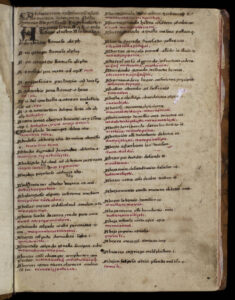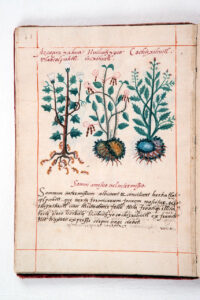Please note that the date and time have been updated. The event is scheduled for Tuesday, 26 November 2024, at 6 PM.
Deel deze paginaTwenty years before the Royal University of Mexico was inaugurated for Spanish students in 1554, some youths drawn from indigenous elites in the Valley of Mexico were already receiving a humanist Latin education.

Manuscript copy c. 1545 of Antonio de Nebrija, “Dictionarium ex Hispaniensi in Latinum sermonem” which was published in 1516, with Nahuatl terms added in red by a native Mexican scribe, Mexico,1540s, 3r. Newberry Library, Chicago.
This talk will (1) explain the circumstances which led to a select group of ‘Indians’ receiving such advanced instruction, (2) describe what and how they were taught, and (3) consider the consequences of their training, showing how the indigenous alumni applied what they had learned – in their own scholarly work, and in asserting their own identities and interests in a colonial society. Particular emphasis will be placed on the students’ accomplishments in European rhetoric and its radical differences from what is known about Aztec ceremonial speech before the Spanish incursion.
These specific reflections on the transmission and transformation of European learning in Mexico 500 years ago can prompt a more general dialogue about the way fields such as ethnohistory, history of scholarship, and classical reception are approached today.

“Libellus de medicinalibus Indorum herbis”, Tlatelolco, 1552, 13v, a manuscript at the Instituto Nacional de Antropología e Historia, Mexico. This herbal was written in Latin by Juan Badiano an indigenous Mexican scholar.
About the speaker
Andrew Laird held positions in the universities of Oxford, Newcastle and Warwick in the UK before moving to Brown University, Rhode Island, where he is the John Rowe Workman Distinguished Professor of Classics and Humanities, and Director of the Center for the Study of the Early Modern World. His primary research interests are in classical literature, poetics, Latin humanism, and the history of scholarship in Europe and the Americas. His book publications include Powers of Expression, Expressions of Power (Oxford University Press), Ancient Literary Criticism (OUP), Italy and the Classical Tradition (Bloomsbury) and The Epic of America (Duckworth). His latest monograph, Aztec Latin: Renaissance Learning and Nahuatl Traditions in Early Colonial Mexico was published with Oxford University Press earlier in 2024.
Please note that the date and time have been updated. The event is scheduled for Tuesday, 26 November 2024, at 6 PM.

